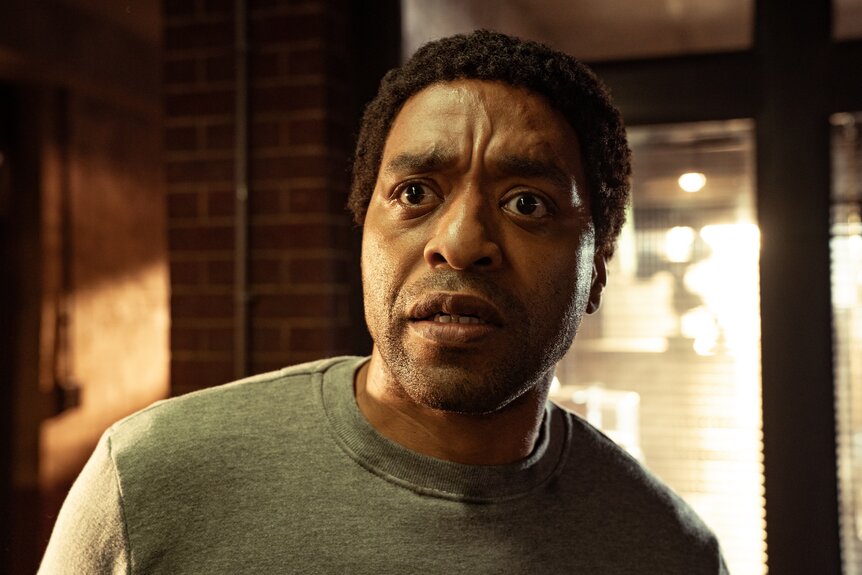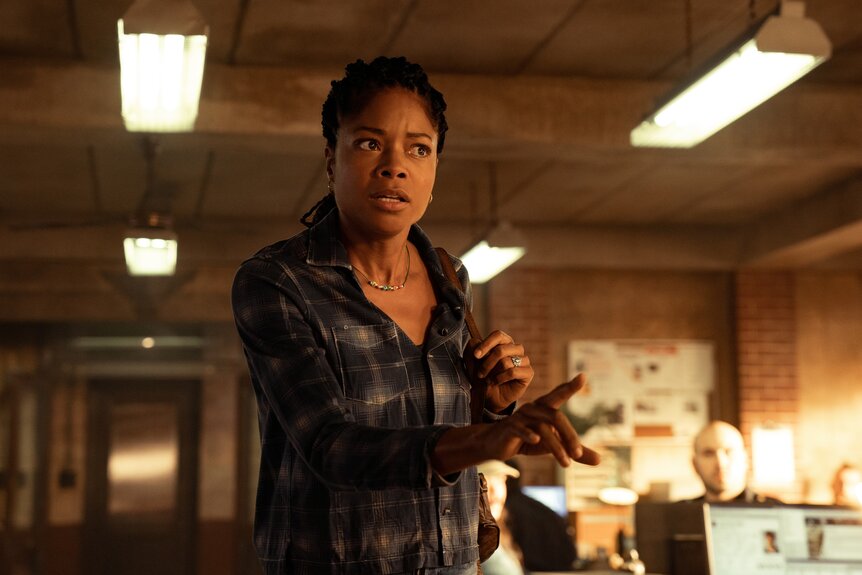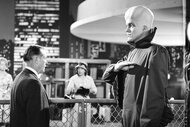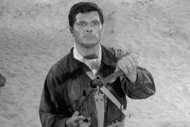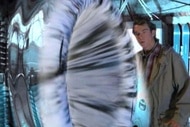Create a free profile to get unlimited access to exclusive videos, sweepstakes, and more!
'The Man Who Fell to Earth' stars explain why the sci-fi sequel is really an immigrant story
SYFY WIRE spoke with actors Chiwetel Ejiofor and Naomie Harris ahead of the new Showtime series' premiere.
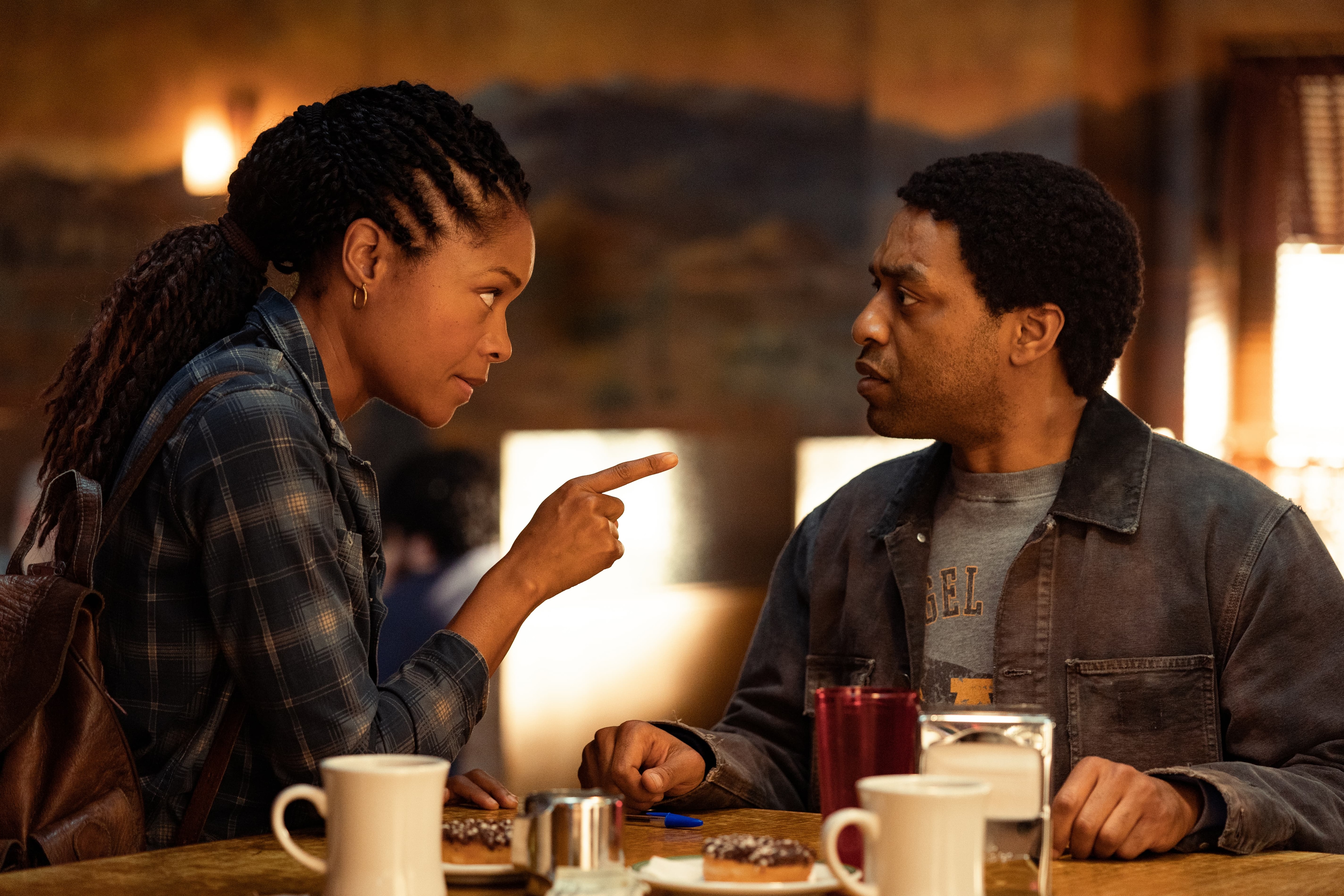
If you are under the impression that Showtime’s new series The Man Who Fell to Earth is simply an ethnically diverse remake of the 1976 Nicolas Roeg film, you would be mistaken. Instead, the ten-episode series is an insightful sequel to the original Walter Tevis sci-fi novel and the movie David Bowie made famous.
The original narrative follows an alien from the fictional planet Anthea who comes to Earth on a quest to find water and resources. Naming himself Thomas Jerome Newton, he patents several inventions that provide him with great wealth and privilege, but ultimately he’s distracted by vice and subjected to horrific experiments. He never returns home.
In the series, show creators and executive producers Alex Kurtzman (Star Trek: Discovery) and Jenny Lumet (Clarice) expand the plot by introducing a new Anthean who takes the name "K. Faraday" when he crash lands in New Mexico. To play Faraday, who undergoes immense emotional and physical trauma as he’s forced to adapt to a new planet, species, and a dizzying array of languages and cultural norms, the showrunners turned to Academy Award-winning actor Chiwetel Ejiofor (Doctor Strange).
Unlike his predecessor, Faraday's mission is not to find water. He locates that rather quickly. (Shoving four feet of a garden hose down one of his throats to quench several lightyears worth of thirst upon his arrival). His first order of business is to track down Newton, the character initially portrayed by Bowie, now older and played by Bill Nighy (Castlevania) for the series.
Determined to find his fellow Anthean and former mentor, Faraday enlists the help of Justin Falls (Naomie Harris), a former nuclear fusion scientist who performed an experiment that cost a man his life. She now makes ends meet shoveling biohazard waste at a dump on the outskirts of New Mexico. Falls scrapes by with just enough to feed her daughter and care for her ailing father, Josiah (Clarke Peters). She's at such rock bottom that she's forced to buy his medication from a dealer and prays she can pay her father's physical therapy bill and still afford food.
SYFY WIRE spoke to Ejiofor and Harris about their immersive process, Faraday's connection to Newton, and why at its core, The Man Who Came to Earth is a human story told from an immigrant’s perspective.
How does Faraday regard Thomas Newton since he never returned to Anthea?
Chiwetel Ejiofor: Well, they have a deeply kind of challenging relationship. There's a lot of pain and a sense of abandonment in particular with these two because they had a strong connection on Anthea. So that sense of loss is very strong.
But there's almost a kind of father and son sort of love and affection there underneath it all. So they're very challenged by each other and that's fully explored as the show progresses.
Naomie, Your character Justin's greatest triumph is achieving fusion energy, but it came at such a huge cost to her. How does that affect her journey?
Naomie Harris: She's so reluctant in the beginning to go on Faraday's mission because she's racked with guilt. Basically, she's made her whole life about punishing herself because of what happened. So she really doesn't want to go on this mission, but she eventually comes to learn that the fate of the whole planet and therefore the people that she loves most, hangs in the balance and that's what prompts her to join him eventually.
In the first few episodes, Faraday comically imitates so many languages and dialects and facial expressions. Was that an actor's dream?
Ejiofor: Yes, it was really exciting to be able to play somebody who's experiencing the world for the first time and also assimilating so quickly that he's speaking in different languages. He's trying out different things and different accents and that was definitely one of the things that really drew me in to the character when I started reading the script.
Naomie, is it true that you didn’t rehearse before initial takes? And if so, did any of Chiwetel’s progression as Faraday surprise you?
Harris: No, I didn't rehearse. Chiwetel had rehearsals with Alex, but Chiwetel and I didn't rehearse. So everything that was happening was happening for the first time for me. Especially in the first takes that we did. So I was kept on my toes the whole way throughout filming, which is exactly how I like it. I like to be surprised.
Faraday calls himself an immigrant several times in this series, but it feels like it means something different every time he says it. So did that term take on new meaning for you playing this role?
Ejiofor: Yeah, I think so. The nature of migration is so central to the themes of this story. And the way that we look at immigration. People sometimes look at people who are displaced, and don't always see the fullness of their capacity. Not just in what they might want, but in what they might bring.
I think that's a fault that a lot of people have, a lot of us humans have and I include myself in that context. Sometimes people look at things through a very narrow lens. And what Faraday is asking, I think, more than anything, is to explore opening the lens with how you look at a stranger. They might be there to take something, but they might be there to offer, a salvation that you could only have dreamt of.
Do you feel this is a story about an alien becoming human or about humans becoming more?
Harris: I think it's both really. It's definitely a story about an alien becoming human because we see Faraday when he first arrives and he's just so entirely focused on his mission. [At first], he seems to have no concerns about the family that he's left behind. I think [spending time with] Justin's family, he learns to come in touch with something alien to him, which is his heart, his feelings and emotions. And he starts to really care. So I think that's a massive transition for him.
Ejiofor: Faraday is challenging humanity to look at their own situation in a different way. I think that's one of the things that really appealed to me about this [story]. He's not necessarily prescribing a course of action, but he's saying, “I can't tell you what the future will hold for you, but I can tell you what happened where I'm from.”
I think that that's really powerful and I think that it is encouraging human beings to take more responsibility. So that earth and the planet doesn't end up in the same context as Anthea.
What are some of your favorite moments in the series?
Harris: I really loved the family scenes. Being with Clark who plays my father and, and Annelle my daughter, and Chiwetel as well. It was really warm and when all of us were together, it was really playful as well. So I always remember those moments very fondly.
Ejiofor: There's a whole sequence at the end of the fourth episode, without giving too much away, where he's playing, what seems initially, like a bit of Anthean music and it evokes all of these memories and feelings and emotions. [He doesn’t understand what’s happening] and he goes outside and meets with Justin. And, they have a conversation, a very raw conversation about where they're both at and I found that whole sequence so beautifully written. It was wonderful to play. Amongst a number of scenes throughout the whole series that I loved, I just thought that was very special.
The Man Who Fell to Earth premieres on Showtime on April 24 at 10 p.m. Eastern. New episodes will air weekly.
